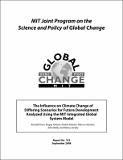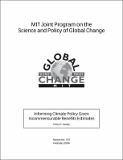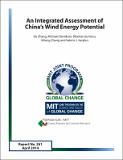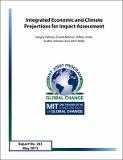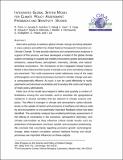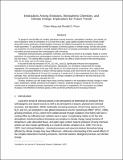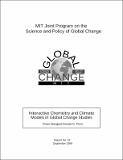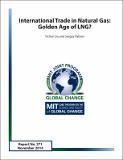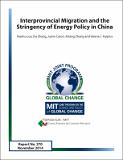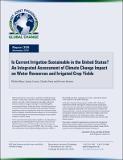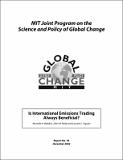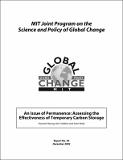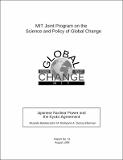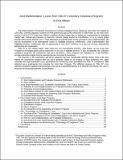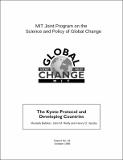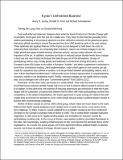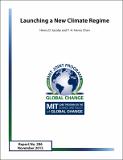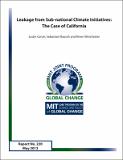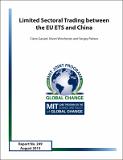Browsing Center for Global Change Science by Title
Now showing items 185-204 of 337
-
The Influence on Climate Change of Differing Scenarios for Future Development Analyzed Using the MIT Integrated Global System Model
(MIT Joint Program on the Science and Policy of Global Change, 2008-09)A wide variety of scenarios for future development have played significant roles in climate policy discussions. This paper presents projections of greenhouse gas (GHG) concentrations, sea level rise due to thermal expansion ... -
Informing Climate Policy Given Incommensurable Benefits Estimates
(MIT Joint Program on the Science and Policy of Global Change, 2004-02)The determination of long-term goals for climate policy, or of near-term mitigation effort, requires a shared conception among nations of what is at stake. Unfortunately, because of different attitudes to risk, problems ... -
An Integrated Assessment Framework for Uncertainty Studies in Global and Regional Climate Change: The IGSM-CAM
(MIT Joint Program on the Science and Policy of Global Change, 2012-06-18)This paper describes an integrated assessment framework for uncertainty studies in global and regional climate change. In this framework, the Massachusetts Institute of Technology (MIT) Integrated Global System Model (IGSM), ... -
An Integrated Assessment of China’s Wind Energy Potential
(MIT Joint Program on the Science and Policy of Global Change, 2014-04)Computable general equilibrium (CGE) models seeking to evaluate the impacts of electricity policy face difficulties incorporating detail on the variable nature of renewable energy resources. To improve the accuracy of ... -
Integrated Economic and Climate Projections for Impact Assessment
(MIT Joint Program, 2013-05)We designed scenarios for impact assessment that explicitly address policy choices and uncertainty in climate response. Economic projections and the resulting greenhouse gas emissions for the “no climate policy” scenario ... -
Integrated global system model for climate policy assessment : feedbacks and sensitivity studies
(MIT Joint Program on the Science and Policy of Global Change, 1998-05) -
Interactions among emissions, atmospheric chemistry, and climate change : implications for future trends
(MIT Joint Program on the Science and Policy of Global Change, 1997-09) -
Interactive chemistry and climate models in global change studies
(MIT Joint Program on the Science and Policy of Global Change, 1999-09)Continually increasing atmospheric concentrations of radiatively important chemical species such as CO2, CH4, N2O, tropospheric O3, and certain halocarbons most likely will cause future climate changes, which could in turn ... -
International Trade in Natural Gas: Golden Age of LNG?
(MIT Joint Program on the Science and Policy of Global Change, 2014-11)The introduction of liquefied natural gas (LNG) as an option for international trade has created a market for natural gas where global prices may eventually be differentiated by the transportation costs between world ... -
Interprovincial Migration and the Stringency of Energy Policy in China
(MIT Joint Program on the Science and Policy of Global Change, 2014-12-02)Interprovincial migration flows involve substantial relocation of people and productive activity, with implications for regional energy use and greenhouse gas emissions. In China, these flows are not explicitly considered ... -
Is Current Irrigation Sustainable in the United States? An Integrated Assessment of Climate Change Impact on Water Resources and Irrigated Crop Yields
(MIT Joint Program on the Science and Policy of Global Change, 2016-11)While the impact of climate change on crop yields has been extensively studied, the quantification of water shortages on irrigated crop yields has been regarded as more challenging due to the complexity of the water resources ... -
Is international emissions trading always beneficial?
(2002-12)Economic efficiency is a major argument for the inclusion of an international emission permit trading system under the Kyoto Protocol. Using a partial equilibrium framework, energy system models have shown that implementing ... -
An issue of permanence: assessing the effectiveness of temporary carbon storage
(2002-12)In this paper, we present a method to quantify the effectiveness of carbon mitigation options taking into account the "permanence" of the emissions reduction. While the issue of permanence is most commonly associated with ... -
Japanese nuclear power and the Kyoto agreement
(MIT Joint Program on the Science and Policy of Global Change, 1999-08)We find that, on an economic basis, nuclear power could make a substantial contribution for meeting the emissions target Japan agreed to in the Kyoto Protocol. It is unlikely however that the contribution would be as large ... -
Joint implementation : lessons from Title IV's voluntary compliance programs
(MIT Joint Program on the Science and Policy of Global Change, 1997-06) -
The Kyoto Protocol and developing countries
(MIT Joint Program on the Science and Policy of Global Change, 1999-10)Under the Kyoto Protocol, the world's wealthier countries assumed binding commitments to reduce greenhouse gas emissions. The agreement requires these countries to consider ways to minimize adverse effects on developing ... -
Kyoto's Unfinished Business
(MIT Joint Program on the Science and Policy of Global Change, 1998-06)The authors offer a provisional assessment of where the Kyoto negotiations have left the climate change issue. They present a few widely divergent assesments of what the Kyoto Protocol on Climate Change will accomplish, ... -
Launching a New Climate Regime
(MIT Joint Program on the Science and Policy of Global Change, 2015-11)At the 2015 UN Framework Convention on Climate Change (UNFCCC) meeting in Paris, participants in a new international climate agreement will volunteer Nationally Determined Contributions to emissions reductions. To put the ... -
Leackage from Sub-national Climate Initiatives: The Case of California
(MIT Joint Program on the Science and Policy of Global Change, 2012-05-29)With federal policies to curb greenhouse gas emissions in the U.S. stagnating, California has taken action on its own. We estimate the impact of California’s cap-and-trade program on the leakage of emissions to other ... -
Limited Sectoral Trading between the EU ETS and China
(MIT Joint Program, 2013-08-21)In the negotiations of the United Nations Framework Convention on Climate Change (UNFCCC), new market mechanisms are proposed to involve Non-Annex I countries in the carbon markets developed by Annex I countries, beyond ...

